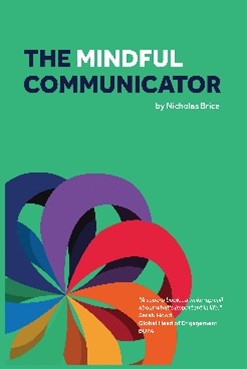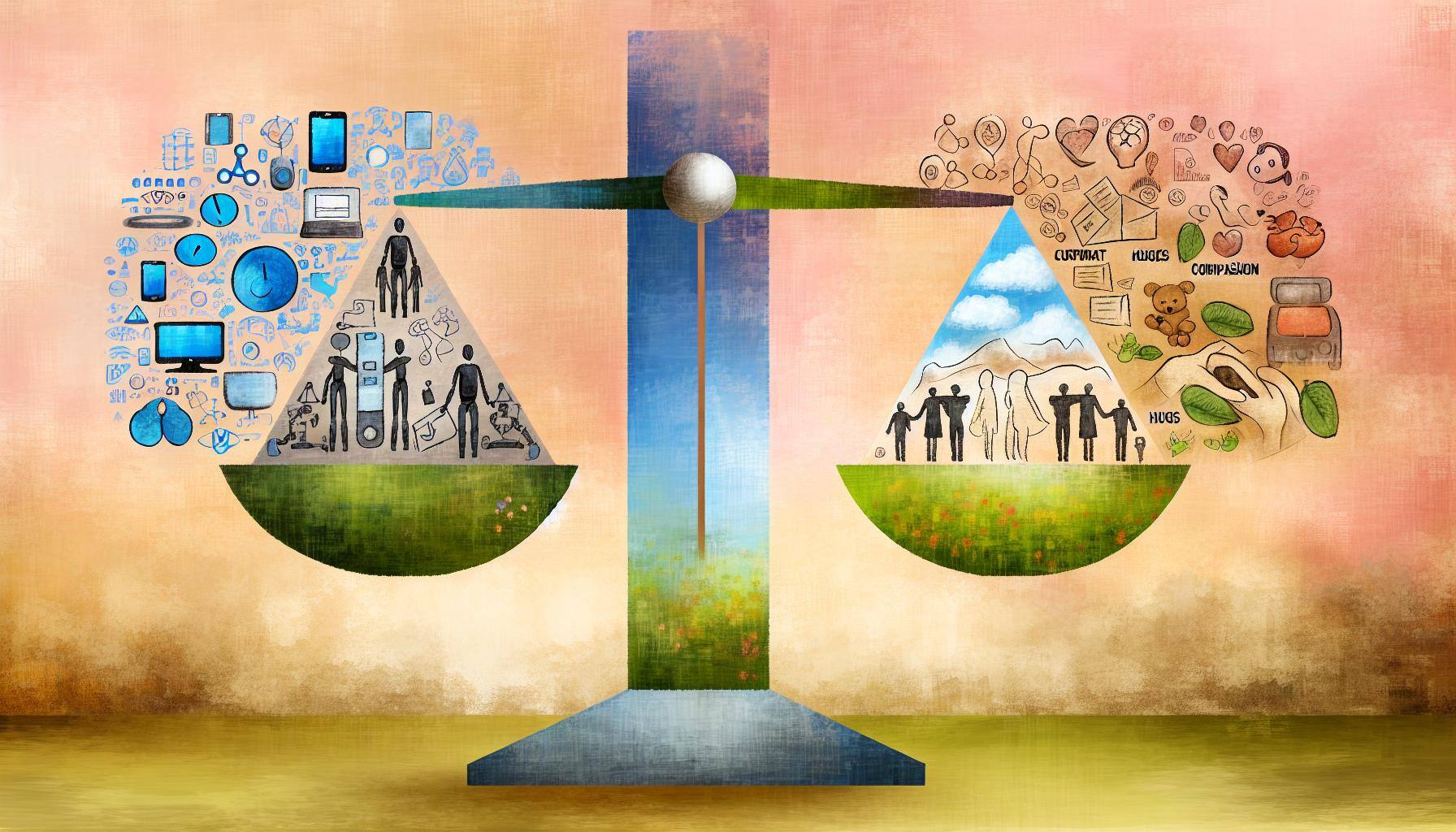Personal Values, Wellness and The Mindful Communicator in Creating Great Customer and Employee Experiences

An Interview with Nicholas Brice, CEO of Soul Corporations and Sarah Hood, Global Head of Engagement, Bupa
Nicholas:
Thanks so much for giving our new book: The Mindful Communicator – a read and such glowing review. On reflection, how might the content help us become better leaders and professionals?
Sarah:
To me personally, the biggest issue I face is that we're just living in a world, now of an onslaught of information. When we look at the brain, it paralyzes you, certainly paralyzes me, too much information. My brain will just go into pause, and I won't act on anything. I'm much better in an environment where I've got a defined amount of information. So, either in my job I'm taking some complex information, and I'm finding ways to simplify it and communicate it, or I'm creating with other people, and taking a nugget and creating it into an idea.
A massive chunk of my job is looking externally and making recommendations to our executive team about what we do with employee engagement and employee listening going forward. And I must be able to sift through all this stuff, and then make sense of it, and decide what's useful, what isn't useful. And even as this week, for example, writing a proposal that's going to be discussed next week, so I've had to be really focused on that. I'm still getting emails and calls all week with, "These are the best HR trends for 2023." "No, no, no. These are the best HR trends for 2023."
So, in the Mindful Communicator, the messages about "Just stop, be present, work with what you've got…” are so key. I find it hard not to have an emotional reaction just the overwhelming onslaught of information.
It's like FOMO – Fear of Missing Out. When you are doing a piece of work you want to make sure that you've scanned everything well so that you can go to your executive team and say, "I've looked at everything and this what I believe is the best." That's hard because there’s so much information coming in so fast.
The volume of information short circuits your ability to think critically about it. I think the skill is working with your brain to just take information, process it, think it through, and then recommend something that's sensible for your organization. That's hard in a world where there's just so much coming through.
THE ROLE OF PERSONAL VALUES AND WELLNESS
Nicholas:
As we talk about in the book: do you think by getting sharper and clearer in the deeper sense of self, what you value and what your purpose is gives you the ability to filter out more clearly what is key information?
Sarah:
I think so, absolutely. And for me, the focus on personal values and purpose is so important. It’s going back to basics in terms of, "What are my values?" And I feel like I've done quite a lot of work on that and feel much clearer, which is lovely. I like to please people. When I'm working with people like my boss, who is wired completely differently, I'm clear, and I take all the information I’ve summarised. I've done what I think is a good piece, and my recommendations. And then when someone who comes from a totally different angle looks at it, I can easily get very derailed, and confused, and paralyzed. Because I'm quite a service-oriented person.
I used to find this really confusing. Now I think I'm just becoming clearer that we're all different, we see things differently. But, in my job, when I'm valued in my job and I make a good contribution in my job, it's all about just staying true and staying confident in my abilities to do what I need to do. Obviously, other peoples’ input is so important, but I mustn’t lose confidence when people are seeing things differently to me, if that makes sense.
Nicholas:
It makes a lot of sense. I've found that particularly in this modern world, unless I'm practicing meditation or doing some other kind of centering, presence building, focusing exercise regularly, when I have a conversation with someone, I find it difficult to really hear what they're saying. And I'm going through the motions, but I get to the end of the meeting, and it’s, "What did they say?"
I'm finding by treating each interaction more carefully and more mindfully, and aiming for a richer connection, it can powerfully change the way that conversation goes. It’s so important for internal and external customer experience, that people feel fully acknowledged and included – especially in a hybrid culture. Particularly when I'm doing speaker coaching, I need to train myself to really watch someone and really engage with them, especially online. I find practicing some of the methods in The Mindful Communicator make a huge difference. With speaker coaching, we can do whole programmes online now, from start to end, including their doing a keynote and getting rich feedback. We create rich connections online. I find that when people are truly present when they're online with each other, they can replicate the intimacy of being in the office quite well. The reason they're not experiencing that is not to do with the fact that it's hybrid, it’s often the level of digital distraction people are experiencing at that moment. It can also be the technology. If you've got a tiny little 11-inch screen, it's not helpful. I mean, I invested in a 32-inch screen, which I would say, for hybrid, is an absolute minimum. You need to be able to see someone's head the same size as theirs, you know, so that you can engage with them fully, the same as if you were having a meeting in a meeting room or cafeteria.
BEING THE MINDFUL COMMUNICATOR IN A CONTACT CENTRE
Sarah:
I think there's so much value in your work. So, prior to the role I'm in now, I was a Contact Centre manager, and I stay connected with them, because they're good friends. It’s a really challenging environment. I was talking to them just this week…They've had ongoing recruitment challenges over the last year, and they've been brave and decided to start recruiting fully remote teams for Contact Centre customer service work. So, it's a pilot, so we'll see how it goes, but they've been flooded with applications. They've had to shut the job ads down, they've got people who've been in situ for a few months now, just loving life. All over the country, people who just wanted fully remote work. But at the same time from speaking to the Ops Director, one of the persistent ongoing issues in that kind of environment is the manager capability, and you're talking your frontline, first-level managerial job type roles.
And I know when I was the next rung up and I worked in that environment, I quickly learned that if I spent 90% of my time coaching my young new ‘rookie’ managers, I reaped the benefits across everything that I needed to achieve. Because that's all that matters. And these are the kind of skills that I would just worry that we're not really focusing on enough.
Nicholas:
This is interesting, because I've been asked to develop some content for Contact Centre managers around the book. On the face of it, it’s tempting to assume, “These are call centers, operational, the priority must be making technology and operations work better." It's not immediately intuitively obvious why the Mindful Communicator might be the most relevant thing on which you could focus.
Sarah:
Yes, exactly. Exactly.
Nicholas:
I remember once working with a mobile communications Contact Centre and we put a programme together which was simply about developing yourself. And we had this model, which was, “Well, people often only stay in the jobs a short while and we're never going to change that. But we might be able to create a culture where they want to do their best and to stay a bit longer, and so reduce the cost of turnover by having more motivated and effective people who stay with us longer." So, we put this programme in, where we helped them develop their career plan, and a plan for personal development beyond just working. And the company invested in this, and it created such a lovely response and a loyalty in the team that it really affected their turnover rates.
Sarah:
That's amazing, because again, you can sometimes think, "Oh, well we can't offer them everything that they want, so we won't do it internally." But, just doing it, regardless of whether they stay with you and move on to other roles, but just doing it for them.
Nicholas:
"We're doing it for you whether you stay or go. And even if you do leave, you'll say really good things about us as an employer."
Sarah:
Yes, exactly.
Nicholas:
"At best, you'll stay longer than you would've done, being more effective and that'll save us a load of money and improve our customer experiences."
Sarah:
And even better, some of you will become the leaders of the future. That sounds hugely beneficial.
THE WHOLE PERSON AT WORK: LEADERS AND TEAM MEMBERS
Nicholas:
I'm trying to remind myself daily, how important it is to be able to be present, find my deeper self so that I can get out of my ego and my immediate knee-jerk reactions to things. So, through practice, there's a little bit more patience, there's a little bit more steadiness in the way in which I’m working, there's a bit more focus and calmness to what I’m doing. It's about working out what our values are so that we can prioritize information more effectively, having a sense of personal purpose, and mission, and values. Because we all know that organizational values mean nothing unless we can say, "Well, those are basically my values too, near enough, so I’m in." It's the personal uptake that we’re looking for. That's the only thing that drives commitment as we know that from the research I have cited in the book.
Then it's looking at things like structure and overview, and how you simplify things, and make sure that your desk, laptop, phone and working area are not too busy, and that your communication is well structured and clear. It's about saying, "Are you spending time doing nutritious things on a daily basis? Are you raising your energy level or are you depleting it?" Building a plan for being your best self.
It's also then thinking, "Right, what fruits are you going to create? What's your best self? What's going to be the content of the dash between your born and died date on your gravestone? What's going to be the apples, and the fruits, and the pears that you've created?" So, getting focused on all those things I think, as a person, brings you alive fully wherever you are.
Sarah:
Yes. Very universal
Nicholas:
So, what we're saying is we will as leaders enable people to create a sense of purpose, joy, satisfaction and wellness for themselves and each other, even despite the organizational culture that they find themselves in. Rather than, as many organizations do, trying to do numerous corporate-wide initiatives that try and address the people problem, but end up just adding to the corporate noise that these people are hearing.
Sarah:
Yes, and they make it worse. Their intent was to make it better, but they make it worse.
Nicholas:
So, what's realistic? What do you think's the real value that can be created with someone in the center Contact Centre from the Mindful Communicator?
Sarah:
Yes, I mean, I think in my experience, a Contact Centre is the most challenging environment that I've ever experienced in a workplace. And I suppose I always just think of it from a management perspective. And I mean, I obviously I never did the job myself, if you know what I mean. I know that when you mentioned sweatshops, they are a bit like modern-day sweatshops. I always go to the management experience and where I think that that needs to go, and that's to drive the experience for people doing the actual work. They're working in an environment where it would be so easy to get sucked under by overwhelm. It's also the same environment where, if you are a young person looking to progress, I would say certainly at Bupa, this is where our first managers are created…but with fairly light support.
We don't have the privilege of taking them all off and putting them through a long development programme and it's possibly a bit old school now to take people through classroom training on management stuff now. But this work is so universally applicable, it could impact anyone, anywhere, doing anything. So, what are my highest challenge areas, where this could have the most impact? It would be frontline managers in Call Centres.
Nicholas:
And what problems would it help them solve? What would it solve? What challenges would it help them solve?
Sarah:
If you could really get them in a better place individually and personally, then I think they would drive engagement in their teams. And, if you're improving your employee experience and engagement in that environment, then your business results follow. So, your customers start to experience that, and then all your business results start to follow. There have been so many studies on that one. So, it would impact everything, but I do think that they hold so much of the experience because they hold the experience of their teams, they therefore hold the experience of all our customers contacting us.
Nicholas:
I hear two things from what you are saying. I hear one for young people.
Sarah:
Yes, yes.
ONLINE AND IN-PERSON DEVELOPMENT
Nicholas:
Let's imagine that, for example, The Mindful Communicator is being served up weekly or every two weeks, 60 or 90 minutes at a time in a small cohort – perhaps with a mix of people of different levels. Everyone is a human. Everyone is included. You attend a session, you go away with a challenge, an implementation challenge for the week ahead. You know you're going to come back a week or two later and talk about it, and we add a ‘Buddy’ into the mix. There are one or two people in this small group, to help be an accountability partner. So, you're on a mission in the gap to implement something. Even a little video appears halfway through the week to remind you of what you're going to do, but there's an ongoing personal development journey rather than one big event. Two weeks would be the maximum, because people would just drift off it if it were longer. Are we saying that potentially for a young leader initially and then their people you're helping them create their own development plan: personal effectiveness, work, wellbeing, health. And that then becomes their development plan for three-six months, it gives them a plan to work on. And it fits there, and they do the exercises, and then you have refreshers, and then you come back together to share and connect with you co-workers.
You’re giving people an external coach. And they go online or face-to-face or a combination, perhaps a couple of bigger in-person events along the way to balance and vary the programme. They get a chance to be very real and open with each other every week or two. And we do exercises where they can connect, and we help them feel part of a closer community, without them having to come into work all the time.
Sarah:
Yes. Yes.
Nicholas:
And we also meet that need for affiliation and for connection, because we do exercises a little bit deeper with time and we also coach them a little, i.e., "Don't keep looking at your phone while you're doing this, let's…."
Sarah:
Yes, yes, yes, exactly.
Nicholas:
There’s the management piece, and the staff piece. And it's all done with this mix of friendly, warm, interactive online and in-person sessions.
Sarah:
Yes, exactly. It's all about you, it's investment in you. I mean, what we're talking about doing with our engagement survey this year. You're familiar with employee engagement surveys, but we run two a year across all of Bupa, same time, mass census. We look at things like empowerment, ability to challenge a status quo, how well people work in collaboration with each other, how confident people feel in leaders. All those questions. Whether they're excited about Bupa's future, whether they think we deliver great customer service. We tend to do a light survey mid-year and a fuller survey at the end of the year. What we're proposing doing this year is in our mid-year light survey, is taking out any questions that are about Bupa and the organization and doing a fully employee-centric survey. You're only talking eight to ten questions, so it's not big.
It’s as if you were going to run a customer service satisfaction survey, but one that is all pointed at your employees. Do you feel cared for at Bupa? Do you have everything that you need? Do you feel that you've got a career? Do you have the tools and resources to do your job? All that kind of stuff. What we're saying is, "It's not about us, it's about you." Because we've learned through our engagement data that it's highly, highly personal. I think gone are the days of, "Let's just all sit down and talk about our engagement results." We're almost dissuading that now. We're now saying, "You leaders need to be speaking and connecting with your people individually, because how they experience work and what's important to them at work is so different to the person next to them." Again, I see how that works nicely with this as well.
Nicholas:
Yes, because if we this material in common, we can both talk about daily practice, panning for gold, chunking out intentions, and we know about gratitude lists, and we both know the importance of profound curiosity, and we both got some of this stuff about bearing fruits. We've got a language which unites us in supporting each other's personal growth-
Sarah:
And knowing each other's values.
Nicholas:
So, rather than, "Here's the company again with its values, again…" We work with what people value personally and how they express these principles in their work-home lives. There was a company that tried different ways of inducting staff. One group just got the standard operational induction, "This is where you work, this is the organization chart, this is the forms you fill out…Now off to work." Another group got that plus a senior person coming in and doing a keynote about company values. Third group spent time exploring their best selves and telling each other stories, and the normal induction.
Here's what they found, when they looked at how each group were performing six months later in terms of CSAT scores and whether they were still working for the company.
Sarah:
Send me that over. Yes. Well, it sounds like it worked, doesn't it?
Nicholas:
Yes.
Sarah:
Okay. I have regular catchups with a couple of those people over there. I'm already working on a piece for them to have a real look at all the engagement data that we get, specifically on the Contact Centre environment. What's going on when we compare our Contact Centre environments around the world. We cut results in all different ways, and all the results and actions are all local, which is where they should be. But we'll look at clinical versus nonclinical, but we've never really looked at Contact Centre environments as a unique environment of working. So, I was already starting off down that track anyway, so I think I would love to get your book to a couple of those folks.
Nicholas:
That's been so helpful. Thank you so much, have a lovely day.
Sarah:
Thank you again for the book, and yes, look forward to speaking to you again soon.
FIND OUT MORE…
Nicholas will be running a Masterclass in the morning at the Engage Business Media Future of the Contact Summit on Thursday Feb 9th at The Brewery.
Some of the ideas and tools used in this blog are covered in the new book from Soul Corporations® - The Mindful Communicator by Nicholas Brice (Amazon, Nov 2022). Order a copy for you and your team here.
To discuss your challenges and look at how to tackle them with some of these tools and methods, youcan contact Nick directly at nick@soulcorporations.com or +44(0)7778-356954.



